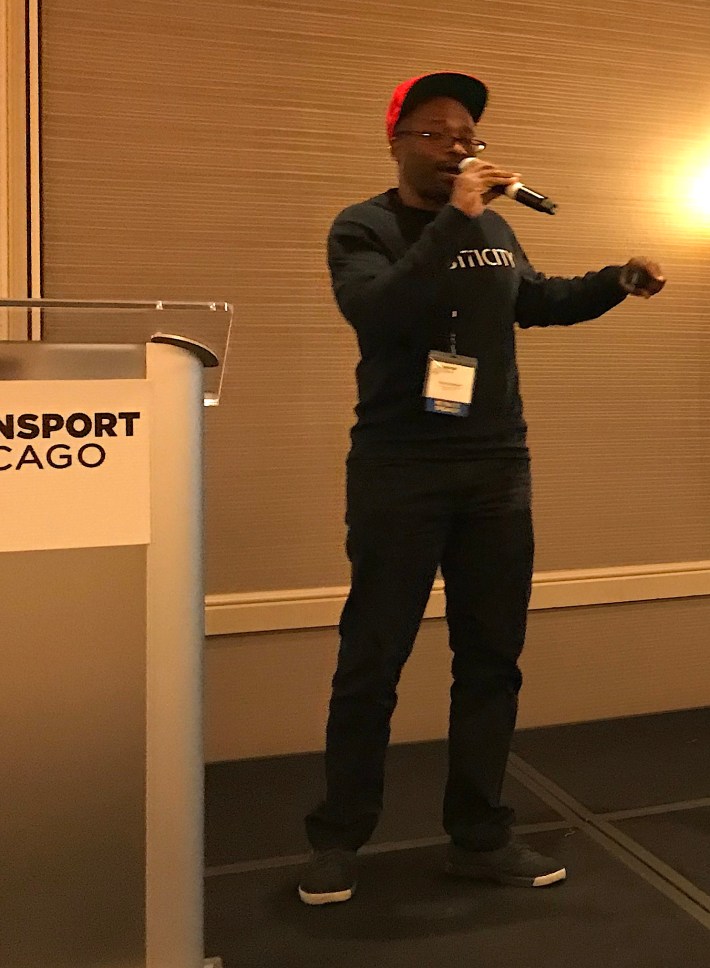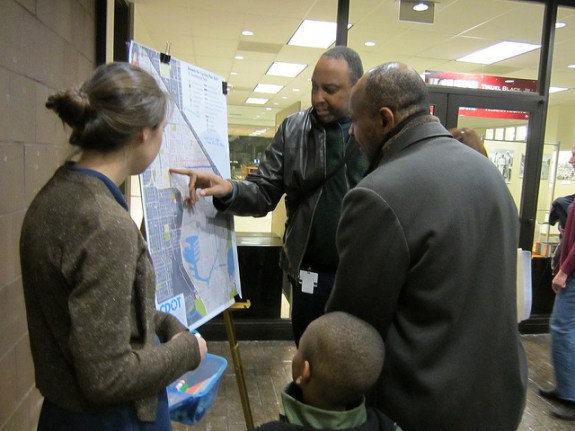During his keynote speech at the Transport Chicago conference last Friday, Equiticity founder and president Oboi Reed called for increased ownership of the transportation planning process in areas populated by “black, brown, and indigenous people of color.” He argued that one reason why low-to-moderate-income neighborhoods of color tend to lack access to safe, convenient, and affordable transportation options is because too many of the people making the decisions about where and how to focus resources are “stale, pale and male.”
Early in his speech, Reed advised the audience that his talk would be “important,” but “uncomfortable,” and he did drive home a few hard truths transportation equity. Community involvement in urban planning decisions, or the lack of it, was an overriding theme. “What we really want to see is not just engagement, we want to see empowerment,” Reed said. He announced that Equiticity, the transportation justice nonprofit he launched last November, recently received a $125,000 grant to partner with the Metropolitan Planning Council, to research transportation equity matters in Chicago.
Reed took a moment to differentiate between "equality," where all residents gets equal resources, and "equity," in which communities with the greatest need get the most resources. He stressed that making walking, biking, and transit safer and more appealing in Chicago's Black and Latino neighborhoods -- where conditions tend to be more challenging than in majority-white neighborhoods -- could go a long way towards improving mobility, health, and the economic outlook of these areas, as well as decreasing violence.

During the question and answer session, a woman asked Reed, an early advocate of bringing dockless bike-share to Chicago neighborhoods that don't have Divvy stations, what he thinks about Chicago's new dockless bike-share pilot on the Far South Side. “[Equiticity supports] Dockless coming to Chicago," he said. "We do have some concerns around how this was rolled out here in Chicago, and what does this rollout mean for the future.” He noted that the pilot only covers the southernmost fifth of the city. “Dockless bike-share should have full access to our city, and in some ways could compete with Divvy on its own merits." Reed argued that because the city is primarily allowing dockless companies to operate in less affluent parts of town, their potential to turn a profit is not as great as that of Divvy, which has stations in many of Chicago's wealthiest and whitest neighborhoods. "Their membership skews white, and their ridership does, as well,” Reed noted.
One transportation planner asked how he could involve more people of color in public meetings. Reed replied that he often hears that question. "You have to recognize that your inability to engage in our neighborhoods -- it’s your fault.” He paused, then repeated with emphasis: “Your fault.” Another pause, then: “Not you,” he gestured at the man, “but your sector.
While everybody had a good laugh at the exchange, the point was well-taken. “You have to take a step back," Reed said. "You have to think about what are your deficiencies. Why are you struggling to do your job?” He noted that historic inequalities and contemporary structural racism are factors in why more people of color aren't involved in transportation discussions,and that needs to change. “We want to control the transportation planning process in our neighborhoods," he said. "It does not mean we want to box you out. It means that we know what’s best in our neighborhoods.”
“What we see too often,” Reed added, “is that people who don’t live and work in our neighborhoods designing projects and infrastructure for our neighborhoods without engaging with us.”'
Reed went on to discuss his belief that the tendency of American bike advocates to view European countries where cycling is a mainstream commuting mode as the ultimate best practice is counterproductive for trying to get more people cycling in LMI communities of color. He argued that rather than urging economically struggling residents to ride to work, hosting recreational rides is a better way to encouraging biking. He asserted that the Latin-American style of bike advocacy, which includes strategies like car-free ciclovía events, is more relevant to Latinos and African Americans in the U.S. He added that efforts to promote biking in Chicago's communities of color are being further hampered by the fact that police have been writing a disproportionate number of bike tickets in Black and Brown neighborhoods.
“We are not doing this work focused on creating demand for mobility at the neighborhood level,” Reed explained. “We believe every person in the neighborhood has a right to the full option of mobility that the city has to offer. Everybody should be able to walk out the door and make a choice between riding a bike, walking, using public transit, shared mobility or driving. Today, we do not have mobility as a human right in our society.”




